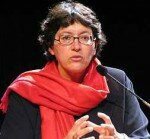By Amira Hass, Haaretz – 29 Dec 2010
www.haaretz.com/print-edition/opinion/israel-s-qassam-strikes-on-gaza-1.333950
Vilnai is depending on Israelis’ total indifference to our Qassams: our soldiers’ nearly daily firing on Gaza civilians, regularly wounding and sometimes killing them.

Amira Hass
If anyone in the world had called Israel an “abscess,” we would have generated a wave of protests, and learned scholars of anti-Semitism would lecture about the vocabulary that the Nazis borrowed from pathology and microbiology (the same holds for Mahmoud Ahmadinejad ). But when a deputy prime minister of Israel and a member of the Labor Party used a clinical metaphor to talk about the Gaza Strip this week (“Gaza is an abscess, troublesome pus” ), no one got upset. We are always allowed to do what others are not.
In February 2008, the same politician, Deputy Defense Minister Matan Vilnai, warned the Palestinians that they would bring upon themselves “a bigger shoah” – using the Hebrew word for both a generic catastrophe and the Holocaust – if they continued firing rockets at Israel. That was shortly before an Israel Defense Forces offensive that killed 107 Palestinians, more than half of them civilians. Two IDF soldiers were also killed.
Vilnai’s words at the time were misunderstood, or deliberately twisted, making it sound like he was pledging that Israel would bring about a “bigger shoah” in Gaza. (“Bigger” than what? Than the Nakba of 1948? ) But he did announce that Israel would take revenge imminently, and laid the blame on the Palestinians. And without intending to, he revealed a characteristic imperviousness to the connotations of his words and showed contempt for our people’s history.
Exactly two years after the start of Operation Cast Lead, an offensive that kept 1.5 million people trapped by clearly superior Israeli firepower, Vilnai decided to describe the Gaza Strip as an abscess. What was he trying to convey when he made his comments Monday during an appearance before the Eshkol regional council? That now Israel needs to use radical surgery to fully remove the localized infection? Vilnai once again renounced any Israeli responsibility for the volatility, placing all the blame on Hamas. “Instead of worrying about its own people, Hamas is trying to conquer Jerusalem,” he said.
Vilnai didn’t have to depend on Israelis’ short memory, since you can’t forget what you don’t want to know in the first place. He is depending on Israelis’ total indifference to our Qassams: our soldiers’ nearly daily firing on Gaza civilians, regularly wounding and sometimes killing them. The civilians are mainly farmers trying to work their land, fishermen who make their living off the sea, and unemployed parents and their children who rummage through the rubble of Gaza’s former settlements.
Just like the masked men of Iz al-Din al-Qassam, Vilnai is employing the logic of “They started it, so we have the right to respond.” Hamas cannot guarantee even that college students will be able to reach their universities or that destroyed Palestinian homes will be restored, so it boasts about some mythical future. For domestic consumption, and to justify Islamic financial support, Hamas commanders are faking their ability to match the IDF’s deterrent capability. Along comes Vilnai, who uses that to depict a virtual reality in which Israel is not the occupying power but the victim, and to say that the reason Israelis in the south don’t feel secure has nothing to do with his government’s policies, but is linked to some kind of external contamination.
In January 1991, when Vilnai was GOC Southern Command, he signed a military order on which the entire disastrous Israeli policy toward Gaza is based. It was the order to revoke the general exit permit granted to Palestinians at the beginning of the 1970s. In other words, it’s the order that denied the Palestinians’ right to freedom of movement and that imposed the closure regime that prevails to this day. Beyond the economic deterioration and the serious health and environmental damage that continues to be caused by the closure, the isolation from the rest of the world – especially from Palestinian society in the West Bank and Israel – has closed off the educational, cultural and social avenues of development in Gaza.
It was Vilnai’s signature, not a persistent infection, that fated the Gaza Strip to be the world’s largest and most overcrowded detention camp. And we, the Israelis, are its wardens.






































